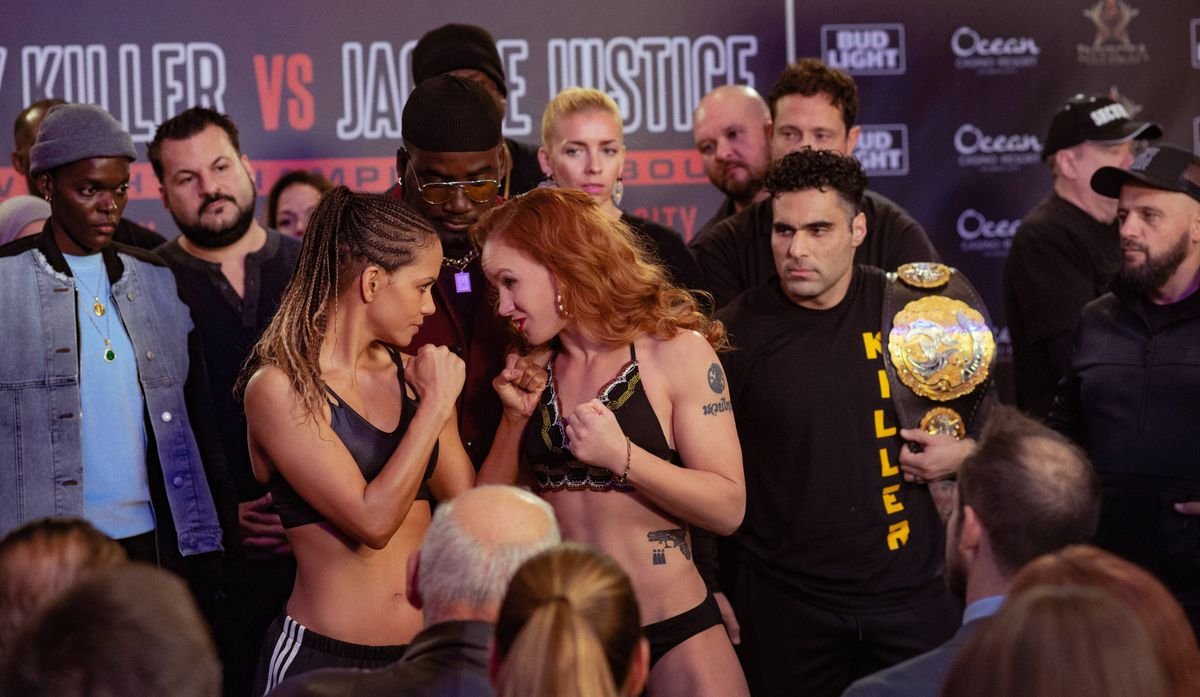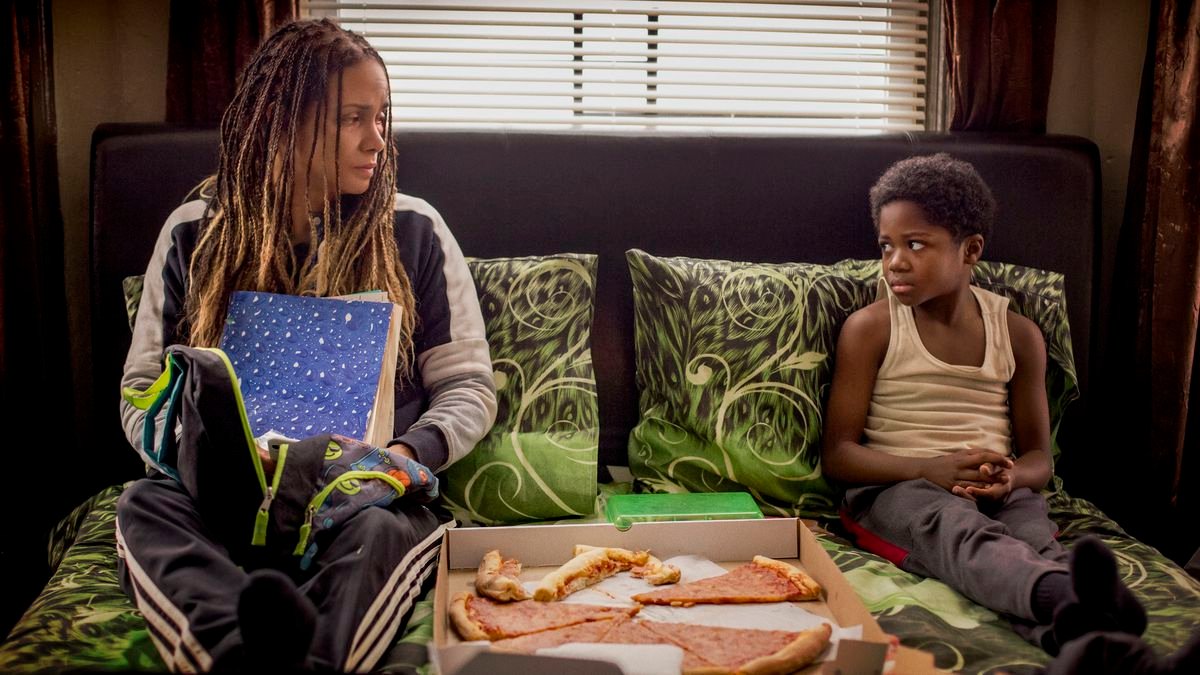Halle Berry has long been a skilled, emotive performer whose movies don’t always reflect her talent. After her debut in Spike Lee’s Jungle Fever in 1991, Berry — still the only Black woman to have ever won the Academy Award for Best Actress — has cycled through various phases, genres, and franchises in her next decades in this business. Dramatic movies often seem unsure of what to do about her beauty, while genre roles that rely on her sensuality often diminish her other talents. Swordfish and Die Another Day made her a pinup, but didn’t give her much else to do past stand around in lingerie. The X-Men franchise and the loose DC Comics Catwoman adaptation let her kick ass, but asked barely anything of her dramatically.
There are exceptions, like the wonderfully complex Cloud Atlas and the locked-room tension of The Call, but far too often, Berry’s performances outclass the films in which they’re found. And Berry’s latest, her directorial debut Bruised, is another disappointing entry in her uneven filmography.
In her role in the Netflix film as mixed martial arts fighter Jackie Justice, who’s trying to claw her way back into the MMA octagon, Berry’s vulnerability and physical grit are compelling and impressive. Berry’s eyes have always been her most expressive feature, and her reactions here let viewers in on everything she’s feeling: her resignation at her downfall from competitive sport and her ensuing joblessness and homelessness, her shock at the return of someone from her past, her determination during endless training sequences, her fragility in a romantic moment. She finds Jackie’s — wait for it — bruised center, and pours herself into the part. This is the unyielding Berry from John Wick: Chapter 3 – Parabellum, and the emotionally open Berry from Cloud Atlas, and the aggrieved Berry from Monster’s Ball. Jackie asks Berry to tap into myriad layers of performance, and she takes us there.

Photo: John Baer/Netflix
But Michelle Rosenfarb’s screenplay underserves her so badly, relying on cliché after cliché of family trauma, sexual abuse, and self-hatred. Bruised quickly becomes the victim of an irredeemable imbalance. The portrait it paints of Black lives is so reliant on violence, abandonment, and cruelty that it inches toward offensiveness in its failure to provide any joy, self-awareness, or community. Berry nails what this script demands of her, but it demands so much that at a certain point, Jackie is no longer a character. She’s a Message About Survival, and while that’s a mainstay narrative device for underdog sports movies, Bruised doesn’t update or energize a well-trod formula.
Jackie Justice is a former up-and-coming UFC star whose 10-0 run ended when she literally ran out of the octagon in the middle of a fight. (The film waits more than an hour and a half to explain this self-sabotaging choice.) In the four years since Jackie fled the bout and left her career behind, she’s tumbled toward rock bottom. She’s living with her emotionally and physically abusive manager and boyfriend Desi (Adan Canto), getting out of shape and drinking too much, and continuing a feud with her negligent mother Angel (Adriane Lenox). She’s tired of people approaching her on the street and pulling up the viral video of the moment so many have construed as cowardly, and she’s tired of not having a purpose.
Two major life events occur that could either get Jackie back on track, or end her dreams for her good. The first is that she gains the notice of Immaculate (Shamier Anderson), the stylish leader of Invicta FC, the biggest female MMA league. He thinks she can make a comeback if she works hard enough, and he connects her with his top trainer, Buddhakan. (Sheila Atim’s best line reading might be her deadpan, doubtful “She’s old” when seeing Jackie in the gym for the first time.) Meanwhile, Angel unceremoniously dumps Jackie’s estranged 6-year-old son Manny (Danny Boyd Jr.) on Desi and Jackie’s doorstep. Jackie hasn’t seen Manny since he was a baby. Manny, after witnessing his father’s killing, refuses to speak. And Desi is cruel and impatient with this new addition to their lives. How are Jackie and Manny going to bond, and how is Jackie going to restart her career?
Bruised’s answers are fairly predictable, and they involve knowing yourself, letting down your walls, and letting other people in. The writing is unremarkable, and some of the scenes are so grueling and cloying that they practically scream “for your awards consideration.” (In one, Manny and Jackie weep and embrace in the middle of the street after hearing “Just the Two of Us” playing on a corner stereo.)
But most of the performances are solid. Boyd is the film’s moral compass, with a thoughtfully reactive performance that doesn’t need speech to communicate his conscience. Atim and Berry have believable chemistry, and the former also demonstrates familiar comfort with Stephen McKinley Henderson, in a too-small role as the coach Pops, who has good comedic timing with Boyd as Manny. But it’s difficult to pinpoint standout moments for any of these actors with a script that’s this reliant on hopelessness as character development and bleakness as world-building.

Photo: John Baer/Netflix
Probably the only way Bruised attempts to set itself apart is by its focus on MMA. The sport’s popularity has been on a steady uptick since the 1990s and then grew noticeably since 2019, when ESPN acquired exclusive TV rights to UFC bouts and began to regularly air headlining fight cards in premier Saturday night time slots. The headline-grabbing antics of figures like UFC President Dana White (who invited former President Donald Trump to various bouts) and its biggest stars, including Conor McGregor (whose recent string of legal issues have arguably overshadowed his uneven fight record), have also broadened MMA’s appeal.
MMA is its own singular world, a messy swamp of legitimately thrilling athleticism and often terrible treatment of fighters by their governing bodies. Mainstream audiences got a glimpse into that with the 2011 Gavin O’Connor film Warrior. Bruised, which touts the UFC as the top tier of MMA, and features its various official logos and iconography, dares not question the organization’s (often questionable) business practices or (sometimes racist) marketing antics. For viewers aware of those misdeeds, it’s slightly strange to watch Bruised present the UFC’s greatness in such a blinkered way.
That sort of two-steps-behind thinking about the UFC is indicative of Berry’s overall directorial approach. She put herself through a legitimately grueling physical transformation to play a flyweight MMA contender, but her visual approach often fails to capture the artistry of this sport: too-quick cuts that interrupt the flow of action, or askew compositional angles that undermine the effort of her training montages. Both Jackie’s training gym in Newark and the location of her final fight in Atlantic City feel curiously small, without any of the lived-in feel of real places — viewers aren’t going to smell acrid sweat or taste coppery blood during scenes that should be vivid and in-the-moment.
Bruised generally lacks the kind of immersion that a story like this demands. It wants us to step alongside Jackie and stay with her, experiencing her pain and her triumph, but it makes the journey from locker room to octagon unfathomably long. Even a slight dialing back of the continuously tragic mode Berry commits herself to would have made a difference, but as it is, the film fails to land a KO.
Bruised is currently available in limited theatrical release, and debuts on Netflix on Nov. 24.
















































